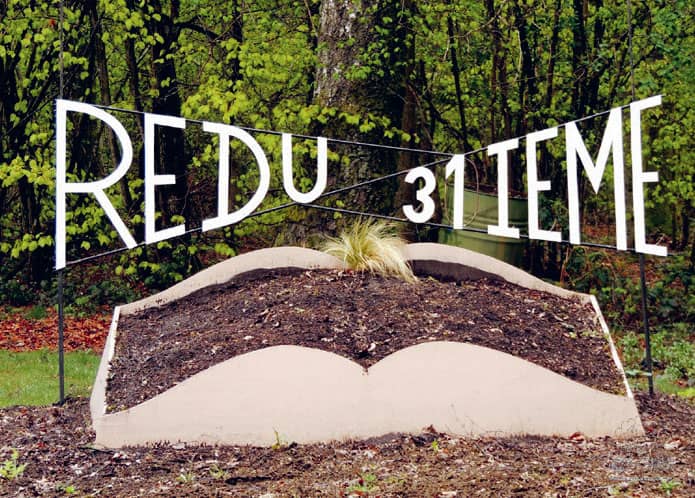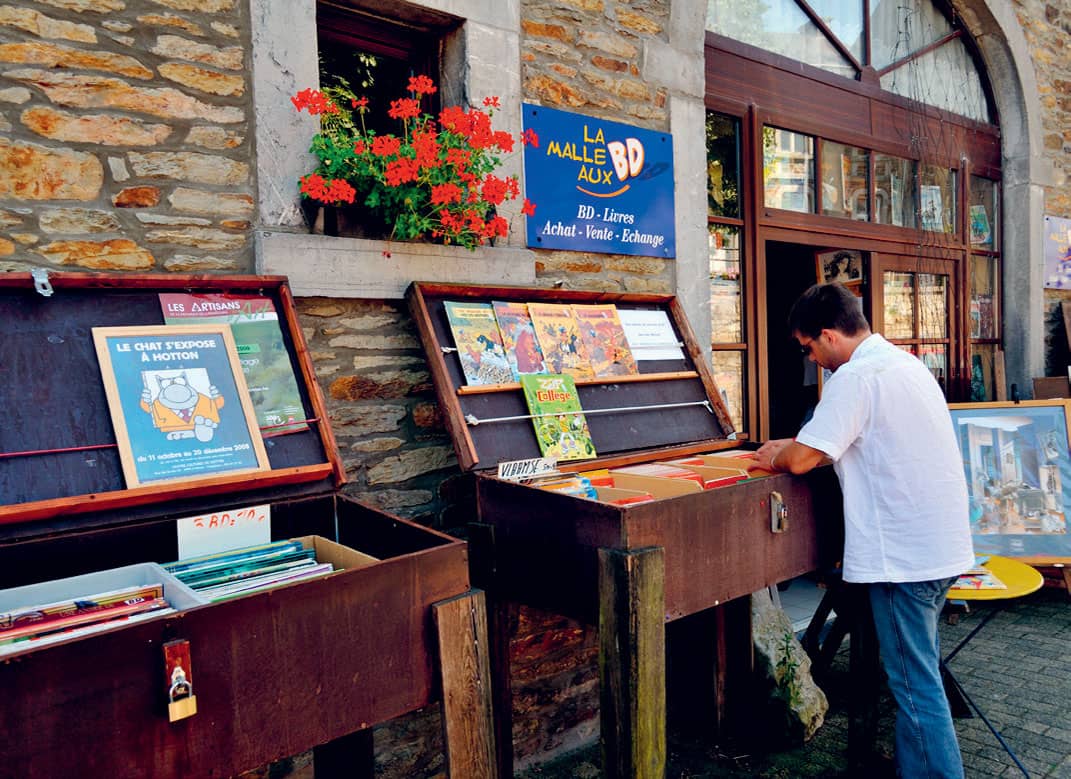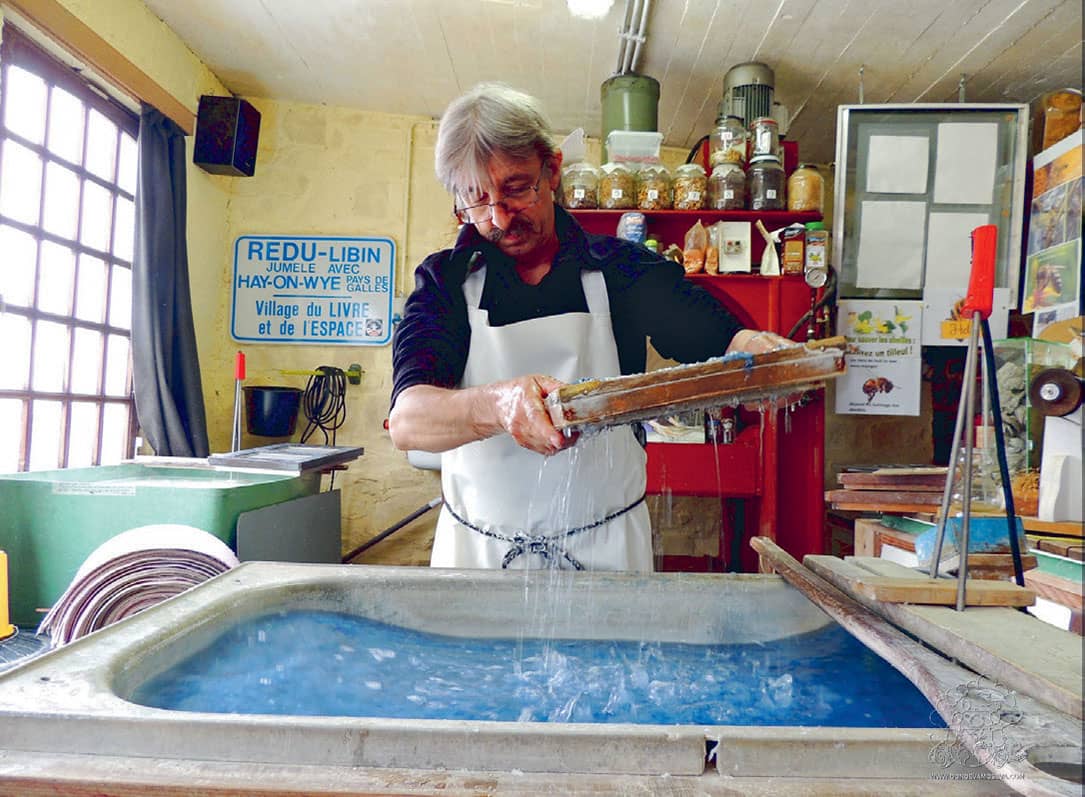REDU
BELGIUM
Rimbaud, Verlaine and Petrarch all enjoyed rambling around the surrounding Ardennes area.
“There’s an old lady who comes from La Louvière by train, then changes at Namur, goes down to Libramont and takes the bus to Redu,” says Marie-Rose Bauvir who runs the Librairie Ardennaise bookshop (Rue de Saint-Hubert) in this Belgian book town. “She visits the bookshops and buys as many books as she can each visit and says as she leaves: “See you next year, if I can!”
Redu has certainly been one of the success stories of the book town movement since it became the first in continental Europe. The founding father was writer and oil industry executive Noël Anselot who was inspired by various visits to Hay-on-Wye in the late 1970s on fishing holidays. He opened his own bookshop in Redu in 1980, largely using books bought from Richard Booth in Hay (the two towns are now twinned). Anselot became a well-known international advocate of book towns, advising on the setting up of others around the world, including Montolieu in France and St-Pierre-de-Clages in Switzerland, as well as the shortlived one at Kampung-Baku in Malaysia in the 1990s. He was also one of the key consultants in the selection of Wigtown as Scotland’s book town. In 1997, he received the Legion of Honor for his cultural commitment. Anselot was ably assisted in establishing Redu as a book town in 1984 by journalist Gérard Valet and the Mayor of Redu, Léon Magin.
The area certainly has plenty of literary connections – Rimbaud, Verlaine and Petrarch all enjoyed rambling around the surrounding Ardennes area – as do several of the bookshops. Fahrenheit 451 (Rue de Saint-Hubert) is unsurprisingly strong on science fiction, while De Eglantier (Rue de Transinne), owned by Miep Van Duin, has a whole floor of books in English in a kind of bookshop-within-a-bookshop called Crazy Castle. Its name was inspired by Skelton Castle in Yorkshire, owned by John Hall-Stevenson, a close friend of Laurence Sterne, which had an impressive library. The rest of the shop offers books in various languages, including Esperanto.

The town church spire peeks above the trees of leafy Redu.
Like various other shops in Redu, De Eglantier is a renovated stable. A traditional farming village, the plan to become a village du livre was an attempt to fight its growing economic downturn, as with various other book towns. Local residents, many of them former farmers, were happy to offer their unused barns as shop premises. After a series of successful book fairs, the local council offered favourable rates to booksellers who renovated unused shop premises. At its peak there were twenty-five bookshops, attracting around 300,000 people a year. These numbers have fallen since then, but there are still a dozen booksellers, all with specialist genres: The Malle aux BD (Rue de Daverdisse) – graphic novels and bandes dessinées (comic books); Le Secret and La Barque Saoule (Rue de l’Esro) – children’s books; L’archiviste (Rue de Saint-Hubert) – archaeology and heraldry; Le mât de cocagne (Rue de Hamaide) – crafts and music; Près d’elle (Rue de Transinne) – nature and health; De Griffel (Rue de Transinne) – gastronomy and folklore.
As well as focusing on the history of religion and Africa, The Librairie Ardennaise occasionally publishes Le Journal de Redu magazine, has a small art gallery and runs Le Musée des Imprimés next door. “Its aim is to trace the history of printing in the Province of Luxembourg from 1760 to the present day,” explains Marie-Rose Bauvir. “Particularly popular for school groups is the room which recreates a printing workshop with machines in working order. The children can get an idea of the evolution of print over the centuries up to the days of the computer.”
There is certainly a hands-on feel to Redu. René Lefer, who once worked with Noël Anselot, produces handmade recycled paper and runs regular demonstrations. Meanwhile Roland Vanderheyden is the third generation of his family to run a bookbinding business, and also offers courses and internships. Redu has also been the headquarters for the Des Livres pour l’Afrique charity which collects French-language books and distributes them to African schools and libraries.
The book town is still very much alive. Anthe Vrijlandt and Johan Deflander came to Redu in 2015 and bought the La Reduiste bookshop (Rue de la Prairie), turning it into a literary vegetarian café and hotel (each of the three rooms has a large collection of books), which also hosts art events.

A book-themed flowerbed welcomes visitors to Redu.

Tourists take their pick from a couple of the bookstands dotted around town.

This bookshop pays tribute to Ray Bradbury’s famous work, and specialises largely in all things science fiction.

René Lefer hard at work making paper.

A woman browses the extensive collection of one of Redu’s bountiful book stores.